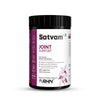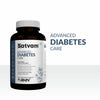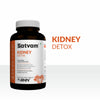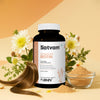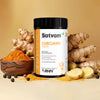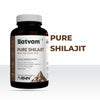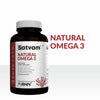Vitamin D is a fat-soluble organic compound that includes vitamins D1, D2, and D3. Vitamin D3, or the “sunshine vitamin,” is vital in keeping humans healthy and it is called so because it is produced naturally by the sun’s UV rays. Its primary function is calcium absorption, crucial for bone growth and maintenance.
About 50% of people globally are affected by Vitamin D3 deficiency. Less time spent outdoors is a major factor leading to a need for higher vitamin D3 intake to prevent chronic illnesses.
Today, D3 supplements can enhance general health. Food like beef liver and egg yolks can also boost its proportion in the body. Let’s understand the benefits of vitamin D3, its sources, and more.
Importance of Vitamin D3
Vitamin D3 is crucial in helping your body to absorb calcium and phosphorus correctly, which are essential for building and maintaining healthy bones. Your body may exhibit signs of an underlying Vitamin D deficiency, such as fragile bones, fatigue, loss of bone density, bone pain, muscle pain, tiredness, low immunity making you more susceptible to infections, depressed mood, and hair loss.
Despite the ambiguity of these symptoms, consulting a physician is necessary; they will confirm the deficiency through blood tests and X-rays.
Bone Health
Vitamin D is crucial for strong bones and teeth as it helps the body absorb calcium and phosphorus. A deficiency can cause rickets in children, leading to bowed legs and dental problems.
Adults who lack Vitamin D can develop osteomalacia, which causes weak bones. Moreover, prolonged deficiency can lead to osteoporosis, which increases the risk of fractures due to diminished bone density.
Boosting Immunity
Maintaining sufficient vitamin D levels can significantly enhance your immune health, decreasing the likelihood of autoimmune disorders.
According to experts, there is a possible link between prolonged vitamin D deficiency and autoimmune conditions like Type 1 diabetes and rheumatoid arthritis.
Vitamin D, also known as Calciferol, is a lipid-soluble vitamin that requires fats and oils for successful absorption in the digestive system. Its key roles in the body are -
- Facilitating bone growth
- Regulating bone remodeling processes
- Governing muscle contractions
- Conversion of blood glucose into usable energy
Benefits of Vitamin D3
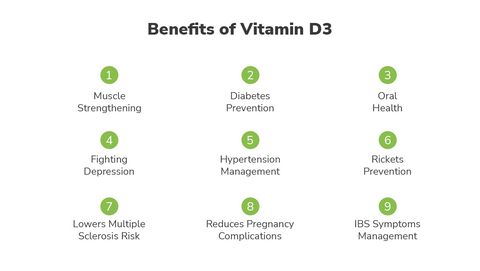
The primary benefit of vitamin D3 remains promoting bone health and immune function. However, there are more benefits of vitamin D3. Here is why you must include this vitamin in your regular diet.
-
Muscle Strengthening
Besides building bones, vitamin D3 also strengthens muscles. It helps to create body balance and reducing fall risks. -
Diabetes Prevention
According to reports, diabetic patients with heightened risks experienced enhanced insulin sensitivity following six months of vitamin D supplementation.
-
Oral Health
As mentioned above, vitamin D3 helps our bodies better absorb calcium. This reduces tooth cavities, decay, and gum diseases, promoting oral health.
-
IBS Symptoms Management
Individuals with irritable bowel syndrome usually have vitamin D3 deficiency. A study performed on 572 participants revealed less severe IBS symptoms with vitamin D3 intake.
-
Fighting Depression
Exposure to sunlight and consumption of vitamin D-rich foods can positively impact your mood. Manage vitamin D3 levels with supplements like Satvam Nutrition Vitamin D3 supplement and fight depression. -
Lowers Multiple Sclerosis Risk
Vitamin D3 can reduce the risk of developing multiple sclerosis, an autoimmune condition that damages the nerves. Higher vitamin levels are linked to lower disease activity. -
Hypertension Management
Adequate D3 levels have been found to reduce blood pressure in hypertension patients. -
Rickets Prevention
Vitamin D3 maintains bone health, which is crucial in children. Children lacking may suffer from rickets. This condition softens bones and affects kids up to 2 years old. -
Reduces Pregnancy Complications
Vitamin D3 deficiency increases the chances of pre-term birth, preeclampsia, and gestational diabetes.
Best Sources of Vitamin D3
Multiple sources of vitamin D3 (cholecalciferol), including animal-based foods, plant based supplements, and sunlight, are available to meet your daily allowance or deficiency requirements.
Food Sources
When it comes to food, vitamin D3 can be found in both plant and animal sources. For vegans and vegetarians, mushrooms, tofu, plant-based milk, cereals and orange juice are your best bets.
Mushrooms, according to the National Institutes of Health, may contain around 366 IU of vitamin D in a half cup when exposed to sunlight.
Plant-based milks such as almond milk, soy milk, rice milk, and cashew milk have been fortified with vitamin D2. Typically, one cup of this milk contains around 100-144 IU.
Fish provide natural vitamin D (oily fish are best), but you'll have to eat about 5 ounces of salmon, 7 ounces of halibut, 30 ounces of cod, or nearly two 8-ounce cans of tuna to get just 400 IU.
Cereals provide a lighter, nutritious beginning to your day as a breakfast choice. Optimal servings of cereals contain 40-100 IU of Vitamin D per 100 grams.
Orange juices, filled with Vitamin D and calcium. Just a single orange or a cup of orange juice can infuse your body with approximately 100 IU of Vitamin D.
|
Food |
RDA (%) |
|
Egg Yolks |
6% |
|
Beef Liver |
5% |
|
Butter |
1% |
|
Cheese |
2% |
|
Cereal |
10% |
Supplements
If you're lacking natural sources of Vitamin D3, supplements are available in various forms, such as capsules, soft gels, gummies, and liquid drops. Always consult a healthcare provider to determine the right dosage based on age and medical history.
Satvam Nutrition Vitamin D3 supplement strengthens bones, lowers disease risks, and restores bone density. It is packed with natural ingredients and improves brain function, boosts mood, and enhances immunity.
Sunlight
An interesting feature of Vitamin D3 is its unique sourcing capability from sunshine. UV exposure activates a compound in the skin known as 7-dehydrocholesterol. This triggers the production of Vitamin D3.
The production rate can vary depending on age and skin tone. Older individuals and those with darker skin experience lesser benefits.
Applying sunscreen reduces this production by blocking UV rays. A moderate amount of sunlight daily helps maintain adequate Vitamin D levels. However, relying solely on sunlight isn't the most dependable method, as UV rays can cause skin cancer.
Vitamin D intake can be measured in either micrograms (mcg) or international units (IU). One microgram (mcg) of vitamin D is equivalent to 40 IU.
Here are the recommended daily intakes of vitamin D:
|
0-12 months Infants |
400 IU (10 mcg) |
|
1-18 years Children |
600 IU (15 mcg) |
|
Up to 70 years Adults |
600 IU (15 mcg) |
|
Over 70 years Adults |
800 IU (20 mcg) |
|
Pregnant or Lactating Women |
600 IU (15 mcg) |
Older individuals, people confined to their homes, or those with darker skin tones are at higher risk of vitamin D deficiency
Boost Your Health with The Sunshine Vitamin
Insufficient vitamin D3 can make bones thin, soft, and brittle. It is a significant nutrient that your body needs. The vitamin regulates key cellular functions in our bodies.
While vitamin D3 is found in several foods, it is required. Satvam Nutrition Vitamin D3 supplements are made from plant-based ingredients like Cholecalciferol from Mushrooms and Shallaki. They enhance calcium absorption and strengthen bones and muscles.
While taking D3 supplements is safe, take appropriate doses. Choose brands like Satvam that offer 100% natural and chemical-free supplements. We ensure enhanced safety with certifications like USDA Organic and HACCP. Boost your health and safeguard your body with the right D3 supplement.



